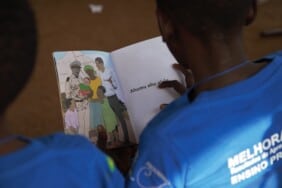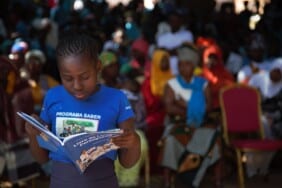Why Bilingual Education is Key to Improving Learning Outcomes in Mozambique
August 29th, 2023 | Blogs
A SABER reading club facilitator leads reading practice in their local language.
Mozambique’ strong investment in education – around 19% of total government expenditure between 2008 and 2018 – has resulted in expanded access to lower and upper primary schools for young people across the country. However, despite improvements in school enrollment, student retention and learning outcomes remain low [1]. The Ministry of Education and Human Development (MINEDH) reports that less than half of the population complete primary school, and of those who do finish, only 8 percent transition to secondary school. Among primary school graduates, nearly two-thirds leave the system without basic reading, writing, and math skills. The 2013 national learning assessment found that only 6.3 percent of Grade 3 students had attained basic reading competencies. Mozambique’s overall literacy rate is 63 percent, with female literacy (54 percent) lagging far behind that of males (74 percent) [2].
The Mozambican population speaks more than 40 indigenous languages, with approximately 85 percent speaking Emakhuwa, Echuwabo, and/or Elomwe as mother tongues while fewer than 3% speak Portuguese as a first language at home.
In addition, a 2018 World Bank survey showed that only 3 percent of assessed primary school teachers mastered minimum knowledge levels in mathematics and less than 1% in Portuguese language [3]. A compounding barrier to quality education in Mozambique is high absenteeism among teachers (45%), and school directors (44%) [4], while students are only in school for 61% of the time.

A student practices reading in her first language with a book developed through SABER.
There is popular support for bilingual education in Mozambique, particularly in rural areas [5]. Bilingual education is seen as a great achievement in the history of Mozambique to promote the value of national languages, reduce dropout and repetition rates, and improve academic success [6].
Mozambique’s first experience with bilingual education was the Government, UNESCO, and World Bank funded Projecto de Escolarização Bilingue em Moçambique (Bilingual Schooling Project in Mozambique, PEBIMO) between 1993 and 1997. In 2003, a second bilingual education pilot initiative was launched by the Government of Mozambique and implemented primarily by the Instituto Nacional do Desenvolvimento da Educação (National Institute for Educational Development, INDE), Eduardo Mondlane University, and two Mozambican NGOs: Progresso and Unidade de Desenvolvimento da Educação Básica (Basic Education Development Unit, UDEBA). Qualitative and quantitative evaluations of the two bilingual education programs reported positive results, with students benefitting significantly from the use of mother tongue in the classroom [7].
This provides evidence that bilingual education has the ability to improve the quality of education in Mozambique and increase active participation and confidence in the classroom for primary school students. Additionally, per MINEDH, 90 percent of Mozambican children begin primary school without knowing the Portuguese language. Therefore, the expansion of bilingual education in Mozambique presents an opportunity MINEDH faces challenges in the roll out of bilingual education as it is costly to develop, print, and distribute teaching and learning materials in all local languages of Mozambique. Another challenge are the costs and capacity needed to organize quality training for teacher and school directors on the pedagogy, linguistics, and management of bilingual education and the subsequent teacher allocation and supervision.
With funding from the United States Agency for International Development (USAID), World Education has worked to improve education and learning outcomes in Mozambique since 2012. We have supported MINEDH to address these challenges through early grade literacy and numeracy interventions in monolingual and bilingual education. In its Bilingual Expansion Strategy (2020-2029), the Government of Mozambique has made a renewed commitment to improving early grade literacy outcomes by expanding bilingual education. Presently, Mozambique has a total of 13,250 active primary schools, with over offering bilingual education programs.

A student demonstrates her reading skills in Portuguese.
The USAID-funded Improved Learning Outcomes in Primary Education (SABER) program represents a continuation of USAID’s bilingual education investment in Mozambique and World Education’s commitment to improving education and learning outcomes in the country. Implemented in collaboration with MINEDH and local partners (Associação Progresso, MEPT, NANA, and UATAF), SABER seeks to improve the life-long potential of Mozambican children by expanding bilingual education and strengthening the national education system as a whole.
As the largest program supporting bilingual education in Mozambique, SABER aims to demonstrate a sustainable model for the expansion of bilingual education that improves student learning and which MINEDH can adopt for further expansion throughout the country. SABER builds sustainability in from the start by jointly developing, planning, and implementing activities with MINEDH, and local partners to strengthen education policies, school administration, teaching practices, assessment tools, and systems to improve school attendance.
SABER will work across 50 districts in Cabo Delgado, Nampula, Niassa, and Zambezia provinces, reaching over 2,249,080 young learners, 4,165 primary schools, and 27,813 teachers over the 5-year life of the program. The program works in grade 1-3 (first cycle) and grade 4-6 (second cycle). An emphasis in the second cycle lies on effective transition of L1 literacy and numeracy skills to Portuguese (L2). Together with MINEDH we design the pedagogical routines, materials, and training approaches to develop higher literacy and numeracy skills of the students
Through SABER, USAID, MINEDH, World Education, and national partners are working together to unleash the transformative potential of bilingual education to improve learning outcomes in Mozambique.
_______________________________________________________________________
[1] Spotlight on Basic Education Completion and Foundational Learning in Mozambique, UNESCO, 2023.
[2] https://data.worldbank.org/indicator/SE.ADT.LITR.MA.ZS?locations=MZ
[3] Education Service Delivery in Mozambique; A second Round of the SDI Survey, Bassi,M et al, 2019
[4] Education in the New Country Programme 2017-2020, UNICEF, 2016
[5] Chimbutane, Feliciano 2011. Rethinking bilingual education in postcolonial contexts.
[6] Henriksen, Sarita Monjane 202. Reflections on the Language Education Issue in Mozambique
[7] Benson, Carolyn J. 2010. The Primary Bilingual Education Experiment in Mozambique, 1993 to 1997
World Education fosters enduring partnerships across regions and sectors to advance education outcomes for all. We offer education systems strengthening, program design and implementation, applied research and evaluation, capacity development, and policy development services.